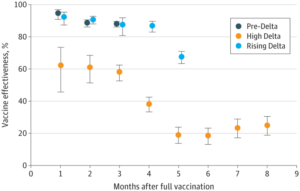
Click To Enlarge: Estimated Messenger RNA Vaccine Effectiveness Against SARS-CoV-2 Infection by Delta Variant Period, January to September 2021
WHITE RIVER JUNCTION, VT — From the time the COVID-19 mRNA vaccines became available in late 2020, VA studies have been crucial to understanding their effectiveness in real life.
Two new VA studies support the value of vaccination in high risk-risk populations. In both studies, however, the vaccines were not as effective at preventing infection as was shown previously, and the vaccines’ effectiveness waned over time.
Because transmission of the SARS-CoV-2 Delta variant increased rapidly during the summer of 2021 and waning COVID-19 mRNA vaccine effectiveness was being reported, researchers at the VAMC in White River Junction, VT, reexamined the estimated effectiveness of the two COVID-19 mRNA vaccines among fully vaccinated male veterans aged 65 and older.1
For the study published in JAMA Network Open, the researchers used electronic medical record data from the VHA’s Corporate Data Warehouse to obtain vaccination status and COVID-19 test results and used SARS-CoV-2 variant tracking data from the national Centers for Disease Control and Prevention to divide the observation time into three periods: pre-delta (before May 2021), rising delta (May and June 2021) and high delta (July through September 2021), when the delta variant accounted for more than 70% of new infections in the U.S.
They then used a matched case-control study to estimate mRNA vaccine effectiveness against SARS-CoV-2 infection. Negative SARS-CoV-2 tests served as controls, and a maximum of four controls were matched to each case based on Department of Health and Human Services geographic region and testing date (within 21 days of the case testing date), because both factors are related to local disease burden, likelihood of having a positive SARS-CoV-2 test result and vaccination status.
The key findings:
- There were 14,238 veterans with a positive SARS-CoV-2 test result and 56,952 veterans with a negative test result.
The estimated pre-delta mRNA vaccine effectiveness against any SARS-CoV-2 infection was 94.5% the first month after complete vaccination and decreased to 87.9% by month three.
- During the high-Delta period, the estimated vaccine effectiveness was 62.0% in the first month and decreased to 57.8% by the third month, similar to the pattern from the pre-delta period. The decrease in vaccine effectiveness accelerated after the fourth month, reaching a low of approximately 20% in the fifth through seventh months.
While the study showed vaccine effectiveness against infections was declining over time, and the mRNA vaccines were significantly less effective against the delta variant, they still hold remarkably well against hospitalizations and deaths, lead author Yinong Young-Xu, ScD, told US Medicine, noting that was not part of this publication.
The study shows new variants and time since vaccination may change vaccine effectiveness, said Young-Xu. “It’s important to monitor it proactively, since it is very much the canary in the coalmine for the health of the nation.”
Effectiveness Against Mortality in High-Comorbidity Population
In the second study, researchers at the VA Puget Sound Health Care System and the University of Washington, both in Seattle, sought to better understand the effectiveness of the vaccine in an older racially diverse population with high comorbidity by comparing newly vaccinated persons with unvaccinated controls.2
Of the more than 5.7 million veterans receiving care in the VA health system, 2,099,871 of those who received at least one dose of the Moderna or Pfizer-BioNTech COVID-19 vaccine from Dec. 11, 2020, to March 25, 2021, were matched to unvaccinated controls in a 1:1 ratio according to demographic and clinical and geographic characteristics. Follow-up for SARS-CoV-2 infection or SARS-CoV-2–related death, defined as death within 30 days of infection, began after the vaccination date or an identical index date for the matched unvaccinated controls and continued until up to June 30, 2021.
In the study published in Annals of Internal Medicine, vaccinated and unvaccinated groups were well matched; both were predominantly male (92.9% vs. 93.4%) and had advanced age (mean, 68.7 years in both groups), diverse racial and ethnic distribution (for example, Black: 17.3% vs. 17.0%, Hispanic: 6.5% vs. 6.1%) and substantial comorbidity burden. Vaccine effectiveness seven or more days after the second vaccine dose was 69% (95% CI, 67% to 70%) against SARS-CoV-2 infection and 86% (CI, 82% to 89%) against SARS-CoV-2-related death and was similar when follow-up was extended to March 31 versus June 30. Vaccine effectiveness against infection decreased with increasing age and comorbidity burden.
In this elderly, diverse, high-comorbidity population, COVID-10 vaccine effectiveness against infection was substantially lower than previously reported, but effectiveness against death was high, the authors reported. They concluded, “Complementary infection mitigation efforts remain important for pandemic control, even with vaccination.”
- Young-Xu Y, Zwain GM, Powell EI, Estimated Effectiveness of COVID-19 Messenger RNA Vaccination Against SARS-CoV-2 Infection Among Older Male Veterans Health Administration Enrollees, January to September 2021. JAMA Network Open. December 15, 2021. doi:10.1001/jamanetworkopen.2021.38975
- Ioannou GN, Locke ER, O’Hare AM, Bohnert ASB, Boyko EJ, Hynes DM, Berry K. COVID-19 Vaccination Effectiveness Against Infection or Death in a National U.S. Health Care System. Annals of Internal Medicine. Published December 21, 2021. doi: https://doi.org/10.7326/M21-3256

